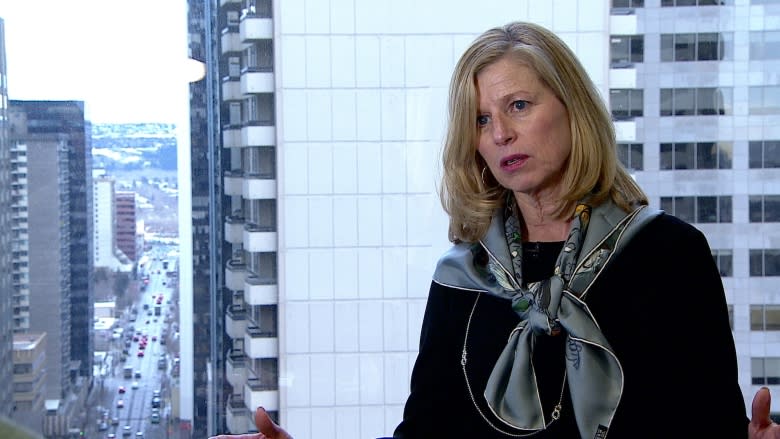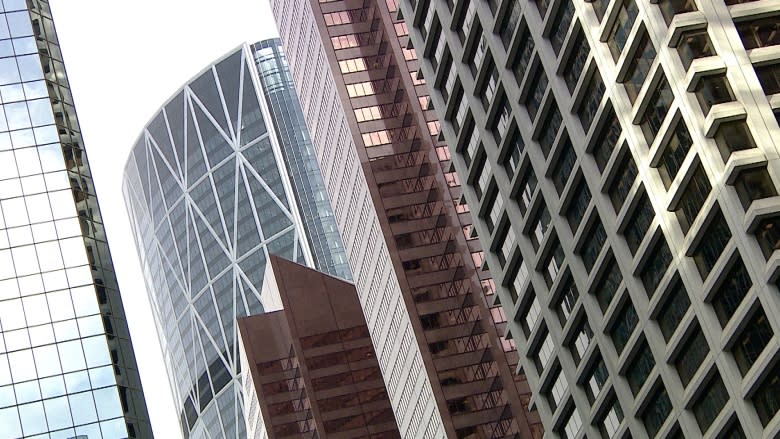Low oil prices hollow out Calgary's downtown core
The heart of our city is hollowing out.
Gone are thousands of downtown white collar office jobs, as oil and gas companies cut employees and slash entire departments.
The core is the economic powerhouse of Calgary — a measure of our vitality as a city.
The towers are our icons.
Whether seen against the flat prairie, or against the backdrop of the mountains, they are the enduring image of Calgary. They are part of who we are.
To a Calgary eye, cranes symbolize good times. A darkened office floor is an economic black eye.
The CBC's Rob Brown met up with Mary Moran, CEO of Calgary Economic Development, for a tour though some of our city's silent cubicle farms, abandoned offices and empty coffee rooms.
They talked about who's been, who's gone and who could move in to give our city a much needed economic boost.
- You can watch the video of their tour above.
- Keep reading below for a condensed transcription of their conversation. It has been edited for clarity.
What does this emptying out of downtown office space do to the city's psyche?
I think it's tough for people to come to work every day and see empty office space. For a lot of people, particularly young people, they haven't been through such a dramatic recession before.
I would say the more seasoned people have probably a little bit more tolerance for it, because they have seen it before. Calgary had significant growth in the late '70s, from a downtown office space perspective. In some ways, it was almost harder in the '80s, because all of a sudden you have extra capacity added on in a rapid rate and then contracted very quickly. This is definitely different than 2009, where office space was threatening to be as high as it was today.
There's a school of thought that post-2009 and during the boom, a lot of these companies expanded too aggressively — over-expanded. They were fat. Do you really think that once things turn around for the price of oil, that all this office space will be filled again? Or will we continue to have large vacancy rates?
I think there are two things happening. It's actually a very interesting crossroad for Calgary. We know from a national perspective that Calgary has a disproportionate number of office towers concentrated in the downtown core.
We have the lowest percentage of residential in the downtown core, so when you talk about this quality buildings, it might be an opportunity to actually repurpose some of the buildings to residential.
Other things, such as incubation space for the Millennials who would like to work and have a place to collide and collaborate on ideas. We know there's a lot of creativity being considered from the real estate industry, and we know there are lots of ideas being considered from the actual building owners on how they can repurpose.
The big buzz word these days is "diversification." Do you think we're capable of diversifying to the point of making up for the jobs lost, if not short term, then in the long term? If so, in what sectors?
I do think we're capable of diversifying. We've seen diversification within this community. It's probably not as recognized in the downtown core because this has been hit the hardest, but we know from all the indicators we watch.
Last year, we only lost 6,800 jobs in Calgary. Net loss of jobs. So we know the other industries have grown. Some of it's been related to population growth, and some of it has been related to industries that we, as an organization, have certainly been supporting in terms of diversification.
But I think the big thing is, you have to remain committed to diversification. For organizations such as ourselves, we have to be focused on diversification in good times and bad times. So, there's lots of low hanging fruit in diversification — logistics is one, but that's not going to help the downtown core.
We're also looking at agribusiness. We're looking at renewables. We're looking at innovation. I think there's opportunity for some of these industries to occupy under-utilized or unutilized office space in the downtown core. There's also industries right now where there's lots of merger and acquisition activity happening outside there energy industry. Shaw and Wind Mobile, Dow and DuPont — all Calgary-based companies that we may have an opportunity to attract.
Do you think we, as a city, have to start thinking of Calgary as more than just the white-collar jobs in those offices downtown?
Absolutely. But I think we have a lot of great assets to diversify into sectors that makes sense for us. I can't emphasize enough: for the region, logistics makes the most sense. For the region, agribusiness makes the most sense.
Just to clarify what I mean by agribusiness: it's about added value products, about actually producing things here rather than shipping things out and buying them back. We have great, locally grown companies here in the agricultural sector, and they ship product out to Italy, have it cured, buy it back and sell it in their stores.
So we as Calgarians buy beer. We buy prosciutto. We buy pasta. We buy mustard. We buy lentil soup, and all the products come from here, but we buy them back in a bag, a box or a can. There's an opportunity to do added value in the agricultural business which will help Calgary.
It is closely linked to logistics, because if we set up Calgary as a western distribution hub — right now [with] the Home Depots, the Sears, the Canadian Tires. We had Target. We have Sobeys — we have to go out and get the Amazon and other consumer goods distribution houses that will strengthen our position, but we're perfectly located for it.
What you have to remember, with both moderate and high quality office buildings and indoor residential buildings, they're typically part of a large worldwide inventory of very sophisticated developers and financiers. It's not like they're going to start liquidating holdings in downtown Calgary because we have a downturn for a year. I think everyone knows demand for energy will always be. Prices will be unpredictable, and unpredictability is market access, which all Canadians should support.
In terms of occupancy of these buildings, do you think they may sit for vacant for years on end?
I think is going to be slower absorption than it has been, in the last five years, but I think there's no need to panic at this stage.
But where are the people going to come from?
If we diversify, they're going to come.
Calgary at a Crossroads is CBC Calgary's special focus on life in our city during the downturn. A look at Calgary's culture, identity and what it means to be Calgarian. Read more stories from the series at Calgary at a Crossroads.





